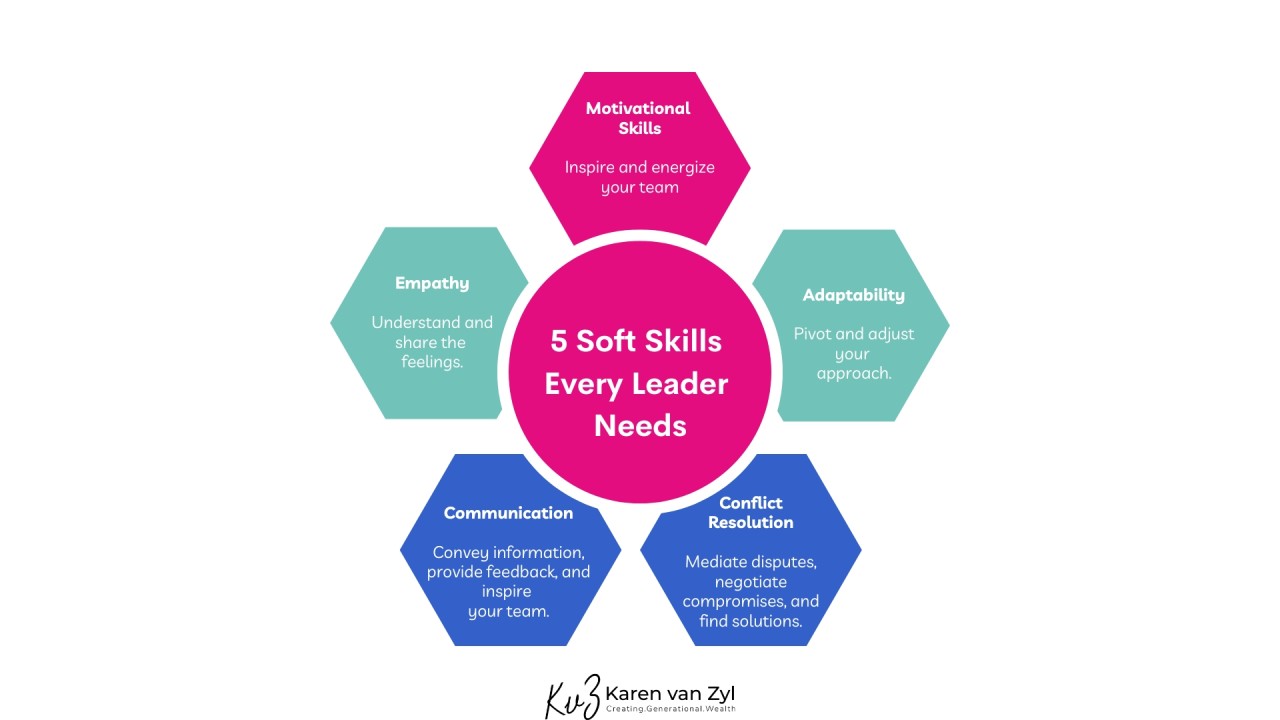
The 5 Key Soft Skills Every Leader Needs
Karen van Zyl
Sales Alchemy: Transforming Businesses and Empowering Business Owners through outsourcing world-class Remote Professionals
The 5 Key Soft Skills Every Leader Needs
Effective leadership goes beyond technical expertise and strategic vision. To truly lead and inspire, you must possess a robust set of soft skills. These interpersonal abilities enable you as a leader to connect with your team, navigate challenges, and drive success.
Here are the five key soft skills every leader need:
1. Communication
To be an effective leader one must have strong verbal and written communication skills to clearly convey information, provide feedback, and inspire your team. This includes active listening, public speaking, and the ability to tailor communication style to different audiences.
Key Aspects of Communication:
- Clarity and Precision: Ensure that your messages are clear and concise to avoid misunderstandings.
- Active Listening: Pay full attention to the speaker, acknowledge their points, and respond thoughtfully.
- Adaptability: Tailor your communication style to suit different audiences, whether it’s a one-on-one meeting, a team briefing, or a public speech.
2. Empathy
The ability to understand and share the feelings of others is crucial for leaders to build trust, motivate teams, and make decisions that consider different perspectives.
Key Aspects of Empathy:
- Emotional Intelligence: Recognize and manage your own emotions while being aware of others' feelings.
- Compassionate Leadership: Show genuine care and concern for your team members' well-being.
- Inclusive Decision-Making: Consider diverse viewpoints to foster a collaborative and inclusive environment.
3. Conflict Resolution
As a leader you must be able to mediate disputes, negotiate compromises, and find solutions when conflicts arise on your team. This requires emotional intelligence and problem-solving skills.
领英推荐
Key Aspects of Conflict Resolution:
- Mediation Skills: Facilitate open discussions between conflicting parties to understand their perspectives.
- Negotiation: Find common ground and negotiate mutually beneficial solutions.
- Proactive Approach: Address conflicts early to prevent escalation and maintain a positive team dynamic.
4. Adaptability
Being a successful leaders means that you are able to pivot and adjust your approach as situations and challenges change. Being open to new ideas and having willingness to learn and grow will only be beneficial to you.
Key Aspects of Adaptability:
- Flexibility: Be willing to change your plans or strategies in response to new information or circumstances.
- Continuous Learning: Embrace lifelong learning to stay relevant and innovative.
- Resilience: Bounce back from setbacks and view challenges as opportunities for growth.
5. Motivational Skills
You can be a great leader that inspires and energizes your team, by setting a positive tone and providing the encouragement and support needed to achieve goals.
Key Aspects of Motivational Skills:
- Inspiration: Share a compelling vision that motivates your team to strive for excellence.
- Recognition: Acknowledge and celebrate achievements to boost morale.
- Support: Provide the resources and support your team needs to succeed.
Wrapping it Up
Investing in these soft skills not only enhances your effectiveness as a leader but also promotes a culture of trust, collaboration, and continuous improvement within the organization.
As the business landscape continues to evolve, we need to be equipped with these skills to be better positioned to guide our teams through change and achieve sustained success.